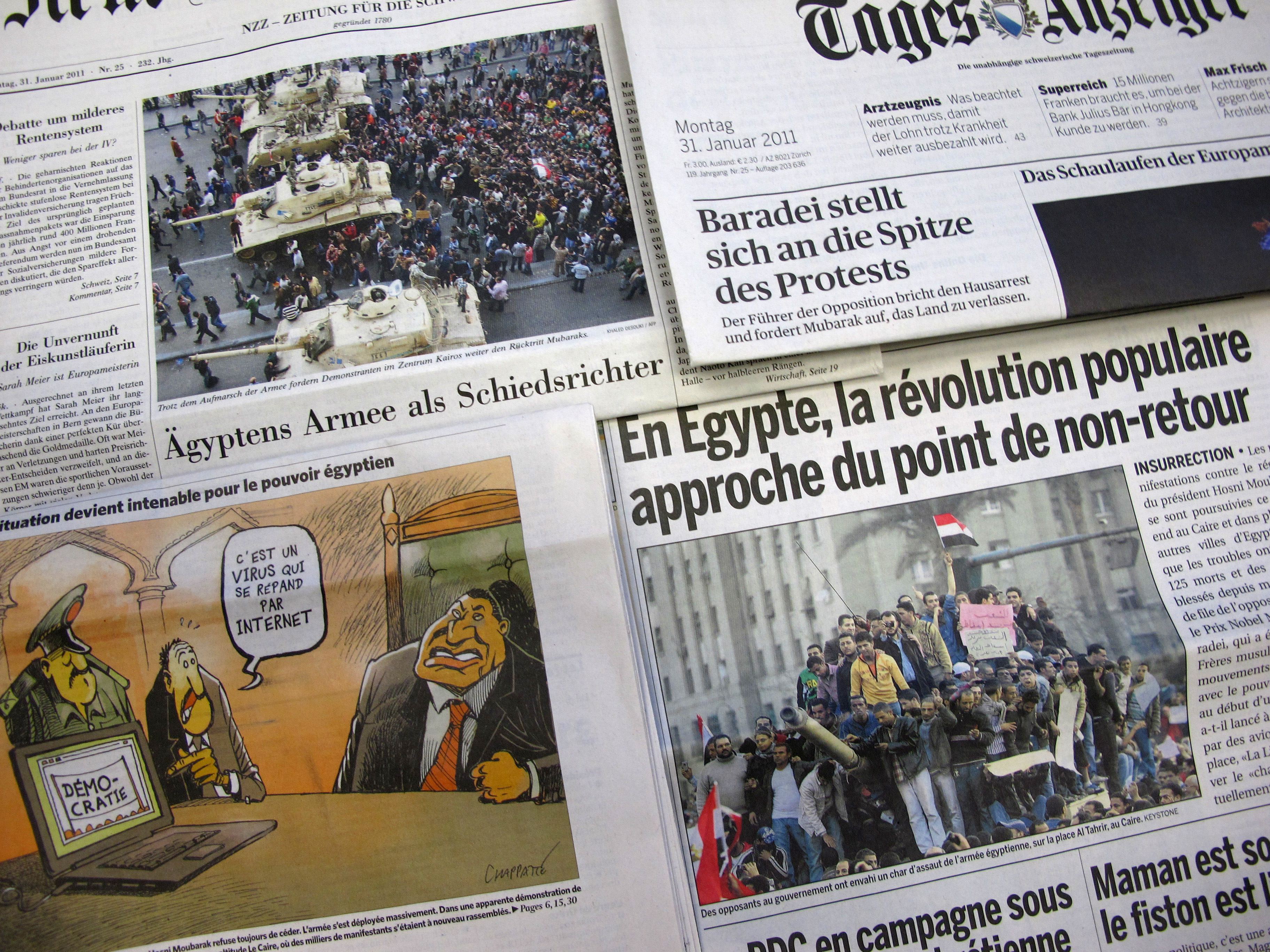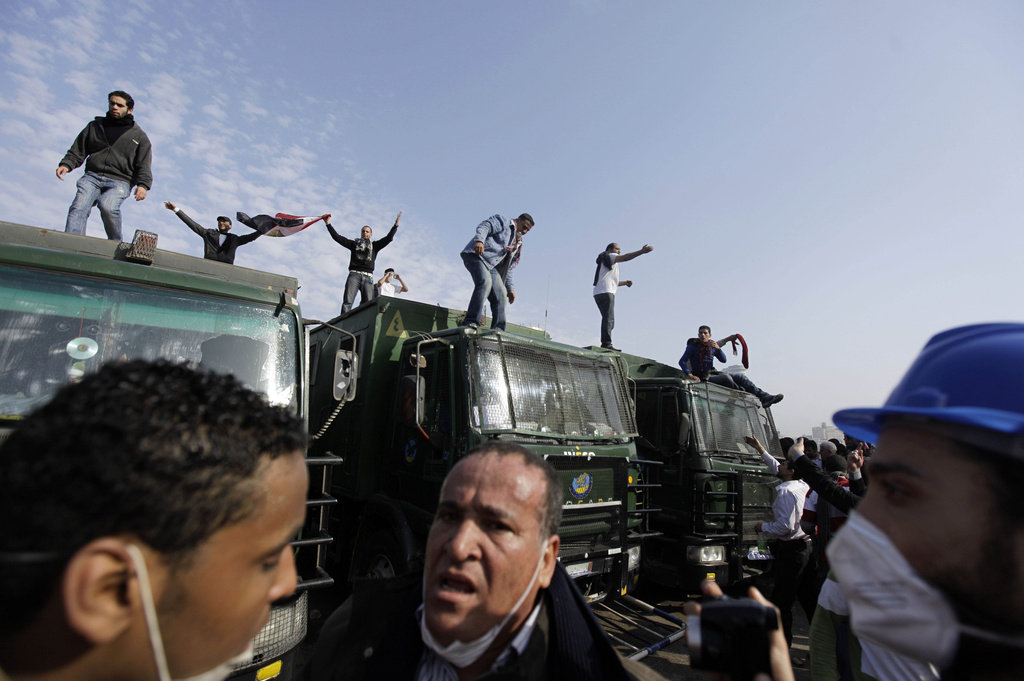Mubarak pledges not to run again

At the end of the eighth day of mass protests in Egypt, President Hosni Mubarak has said in a televised speech he will stand down in September.
Middle East expert Yves Besson tells swissinfo.ch that recent events now require the West to formulate new policies towards the region and also pave the way for Turkish diplomacy to play a role.
Tuesday saw the largest protest in the popular movement to oust Mubarak’s regime with hundreds of thousands of people peacefully taking to the streets of Cairo and the other major cities.
Mubarak defended his record of service and said he intended to transfer power in a way that would fulfill the people’s demands for social and economic change. Presidential elections are scheduled for September, but Mubarak said he would not seek re-election.
A former Swiss diplomat and ex-director of the United Nations Relief and Works Agency for Palestine Refugees in the Near East, Besson says that the current events in Egypt are “extremely encouraging”.
swissinfo.ch: How would you describe what is happening at present in the Arab countries?
Yves Besson: It’s certainly very different from what happens normally. This time around, it seems as though there is no leader who is head of the [opposition] movement or who can lay claim to such a title.
For the first time, it is the result of popular exasperation. There had already been some shudders in Egypt. Last year after elections a number of different events could have given a warning about [the problem]. But now it is much bigger. While it could have fizzled out at the beginning, it swelled and took off.
I see it as a result of unemployment in a population that is mostly young and concerned about its future. It’s all very spontaneous. But the problem with spontaneous revolutions is that someone else can come and take advantage of the situation. Things don’t seem to have gone too badly in Tunisia but we don’t know yet about Egypt.
swissinfo.ch: Do you see any signs of someone taking advantage of the movement?
Y.B.: It is too early to say. We are still at the stage of popular protests. The appointment of a vice-president by Hosni Mubarak shows that he’s prepared the ground for a possible departure.
Omar Souleiman, head of the national intelligence agency and a key figure in negotiations and contacts with Israel and the United States, is now vice-president. He could lead the transition towards elections which would be more free than those experienced by Egypt over the years.
But we have to [wait to] see how the army will react. There are several generations of officers in the army. Will they remember the coup of the young officers in 1952 which led to the first Egyptian revolution, with the elimination of the monarchy and then of General Muhammad Naguib as the head of the country?
All that is ancient history for the young people of Egypt. They seem to be much more guided by democratic ideals. It is encouraging but some kind of meaning has to be given to the word “democracy”.
swissinfo.ch: The Tunisian revolution had in particular a national impact. What is happening in Egypt could have a wider scope. How do you see the consequences of this mass protest?
Y.B.: There are implications inside Egypt. For the time being, it is difficult to say [what they will be] because the Muslim Brotherhood have not shown themselves. They are probably looking for the right moment to do that. From what we know, they seem to be rather divided. In Egypt itself, everything is still possible.
If we look at the rest of the Arab world, such a movement could happen in the streets of Jordan but I think that if that happens Jordanians will have the necessary support, notably from Saudi Arabia, to preserve the monarchy.
At the regional level, what interests me is the silence of Syria. There is no movement on the streets of Syria and the Syrian government is not making any moves. If we make a connection with the reconciliation between Syria and Turkey in recent years, there seems to be a kind of an axis of Damascus/Ankara which could have an influence on the future of the region and which is a balance with the axis of Damascus/Tehran. In the centre are Hezbollah and Hamas.
In Syria, there are movements with Islamic tendencies. But if you ask me, I think that Islamism, which I would call Islamism that dates back 20 years, has no place today. The new generation, which is aged between 20 and 30, appears very tempted by the example shown by Turkey.
As for the problem in Yemen, I don’t think that the demonstrations in Sanaa are representative of a movement in itself. Sanaa is not representative of the whole country, which has remained very divided as far as the tribes are concerned.
Then, of course, there is the future of Iraq… all that is up in the air at present. Until now in the Middle East, there was a juggling act with three balls. One was always in the air, so a balance could be maintained. Now there is going to be a juggling act with several balls which will be more in the air than in the hands. This will affect the United States in particular.
swissinfo.ch: On a more personal note, how do you see this search for democratisation from the grass roots in the region?
Y.B.: It’s fabulous. It’s extremely encouraging. The big divide which Western countries had every interest in keeping alive between the possibilities of a western democracy and respect of a certain number of social norms belonging to Arab-Muslim societies, this divide seems to be disappearing with these events. And the combination could develop along the lines of the example provided by Turkey.
For ten years and under two administrations, the Americans supported by Europeans, notably the British, have wanted to impose democracy in the Middle East with the use of weapons. This policy has totally failed. It is failing in Iraq and in Afghanistan. There is an arch [on the map] stretching from Afghanistan to the Mediterranean which demands a complete rethink.
For me, an avenue has opened today for Turkish diplomacy. The country’s [Turkey’s] economy is in good health. With the reconciliation with Syria, that offers leverage in the entire region and all the more so since Israel has committed the enormous error of falling out with the country.
Unrest in Egypt has killed more than 100 people and the two sides have reached a stalemate. Protesters refuse to go, while the army is not moving them.
After dissolving the government, President Hosni Mubarak named intelligence head Omar Suleiman as his vice-president, and minister of civil aviation Ahmed Shafiq, the new prime minister on January 29. Two days later a new cabinet was formed.
Mubarak’s vows to address public anger at rising prices, unemployment and huge gap between rich and poor have failed to halt their broader calls for a political ejection of Mubarak and his associates.
Many public buildings across the country have been torched.
The United States and Britain have called for an orderly transition to a more democratic system. An Egyptian opposition coalition that includes the mass Islamist movement the Muslim Brotherhood has turned to Mohamed ElBaradei, former head of the UN nuclear watchdog, to form a national unity government and make contact with the military.
The crisis in Egypt follows a revolt that toppled the leader of Tunisia two weeks ago, and a wave of popular anger sweeping other countries in North Africa and the Middle East.
In December 2008 the Swiss parliament made Egypt a key country for economic development cooperation.
Switzerland exports pharmaceuticals, machines, chemical primary products, and matchmaking wares, as well as optical and medical instruments to Egypt. In 2009 exports were SFr656 million ($696 million), imports around SFr109 million.
The most important exports from Egypt are: oil and gas products, crude oil, cotton, textiles, aluminium, iron and steel products and tourism.
Around 1,600 Egyptians live in Switzerland and around 1,400 Swiss live in Egypt.
(Translated from French by Robert Brookes)

In compliance with the JTI standards
More: SWI swissinfo.ch certified by the Journalism Trust Initiative












You can find an overview of ongoing debates with our journalists here . Please join us!
If you want to start a conversation about a topic raised in this article or want to report factual errors, email us at english@swissinfo.ch.